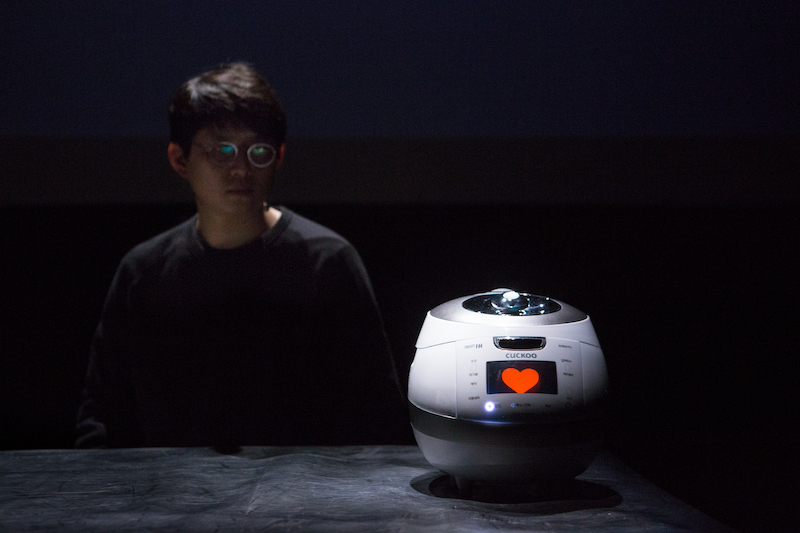Lonely Rice Cookers: A Snapshot of a Generation
Review of Cuckoo by Jaha Koo at On the Boards
Written by TeenTix Newsroom Writer Sky Fiddler and edited by Teen Editor Lily Williamson

Cuckoo: a one-man play in Korean about sentient rice cookers and loneliness.
When I read that description, I knew I had to make it to On The Boards and see it—this creation appeared to be different than any play I’d seen before. The set was simple, with only a box-like table framed by a large projector screen, the stage otherwise so black and barren that it looked like a portal into the void. Cuckoo simultaneously chronicled Korean history since the late 90’s economic crisis, the experience of a generation of young people, and artist Jaha Koo’s own life.
Cuckoo began with a disturbing, attention-grabbing series of strategically cut snippets of real, often violent, footage from the economic crisis that flashed across the screen to the beat of music that can best be described as a soundtrack to the inescapable march of time—pounding rhythms accompanied cyclical, yet not overly repetitive, melodies and other patterns of unusual electronic sounds. As the dust settled from that, we learned a little about Koo’s life and met the three rice cookers, of the popular Korean brand Cuckoo. The Cuckoos, as talking representations of both specifically Korean culture and the universal ritual of making food, created a parallel between another theme of the play: people being forced to become more like machines, and machines becoming more human-like. They added richness to the story, through unique personalities, surprisingly heartfelt songs, interaction with Koo, and taking on the voice of other figures from Koo’s life and elsewhere. The play ended in a not-quite-expected yet seemingly natural scene of music and minimalistic action, tying everything back into the play’s biggest theme: pressure. And Koo didn't let us wonder who was central in orchestrating Korea’s economic collapse, and the pressure it subjected Koreans to. He obviously indicated it as Robert Rubin, of the International Monetary Fund and former US Secretary of the Treasury.

I’m a huge fan of epic, detailed tales, and I can definitely appreciate that aspect of Koo’s work. What made his work stand out especially, though, is how much was left unsaid. When I see art, I’m used to pouring over heaps of information and picking out my favorite pieces. Here, the audience’s job was to put the carefully crafted pieces together. Koo is exceptionally talented at creating a cohesive, emotional, and far-reaching narrative with minimal props and time. Every sound, action, object, word, and even the absence of such elements was a seemingly necessary contribution to one powerful hour. An hour that he spent a year writing and adjusting to get his desired effect.
The footage on the giant projector screen—from personal to national to a disconcerting TED Talk—warped the distances between times and places and people. As different as our life experiences have been, I felt my own mesh with the scene in front of me. The intentional darkness of the rest of the stage filled in with artifacts and feelings from times in my life when I was alone with technology but didn’t feel alone. In a society blurring the lines between the machine and the human, technology may give us the momentary satisfaction of company, but can it replace friendship? Cuckoo reminded me that no, I don’t think it can.
The rice cooker’s personal and generational song about being under pressure was the most impactful. The building of pressure like the cooking of rice, the collapse of an economy, the accumulation of stress in a strictly regulated or overturned life. That’s what the play felt like: not so much a linear build, but a slice across time of a stressed out world. A reach across cultures into the hearts of people who are asking how we got so lonely, and how we can fix it.
Cuckoo ran at On the Boards January 23-26 2020. For event information see here.
Lead photo caption: Cuckoo by Jaha Koo at On the Boards. Photo by Radovan Dranga.
The TeenTix Newsroom is a group of teen writers led by the Teen Editorial Staff. For each review, Newsroom writers work individually with a teen editor to polish their writing for publication. The Teen Editorial Staff is made up of 6 teens who curate the review portion of the TeenTix blog. More information about the Teen Editorial Staff can be found HERE.
The TeenTix Press Corps promotes critical thinking, communication, and information literacy through criticism and journalism practice for teens. For more information about the Press Corps program see HERE.

